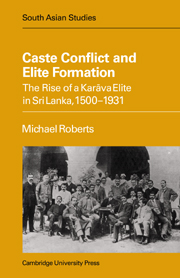Book contents
- Frontmatter
- Contents
- List of figures, chart and maps
- List of tables
- Preface
- Glossary
- List of abbreviations
- Map 1 The Kingdoms of Kotte and Kandy
- Map 2 Some physical features and place names
- Map 3 Present administrative divisions and the contemporary migration patterns of fishermen
- Map 4 The coastal waters of Sri Lanka and southeastern India
- 1 Introduction
- 2 The Karāva in the past
- 3 Caste among the Sinhalese
- 4 Economic opportunities and social relations, 1500s–1790s
- 5 The British period: the economic advances of a Karāva elite
- 6 Social competition, caste conflict and manifestations of Karāva power
- 7 Casteism in South Asian politics during British times: emergent cultural typifications or elite fictions?
- 8 Causal factors in the moulding of Karāva entrepreneurship and the emergence of a Karāva elite
- 9 Concluding remarks
- Tables
- Appendix 1 Problems and cautionary notes concerning the information derived from the plantation directories in the sequential series known as Ferguson's Ceylon Directory
- Appendix 2 A contemporary newspaper account of the reception provided for a Karāva notable on his receiving the title of ‘Mudaliyar of the Governor's Gate’ in 1853
- Appendix 3 A list of caste pamphlets and caste literature in chronological order, 1864–1930
- Select bibliography
- Index
- Frontmatter
- Contents
- List of figures, chart and maps
- List of tables
- Preface
- Glossary
- List of abbreviations
- Map 1 The Kingdoms of Kotte and Kandy
- Map 2 Some physical features and place names
- Map 3 Present administrative divisions and the contemporary migration patterns of fishermen
- Map 4 The coastal waters of Sri Lanka and southeastern India
- 1 Introduction
- 2 The Karāva in the past
- 3 Caste among the Sinhalese
- 4 Economic opportunities and social relations, 1500s–1790s
- 5 The British period: the economic advances of a Karāva elite
- 6 Social competition, caste conflict and manifestations of Karāva power
- 7 Casteism in South Asian politics during British times: emergent cultural typifications or elite fictions?
- 8 Causal factors in the moulding of Karāva entrepreneurship and the emergence of a Karāva elite
- 9 Concluding remarks
- Tables
- Appendix 1 Problems and cautionary notes concerning the information derived from the plantation directories in the sequential series known as Ferguson's Ceylon Directory
- Appendix 2 A contemporary newspaper account of the reception provided for a Karāva notable on his receiving the title of ‘Mudaliyar of the Governor's Gate’ in 1853
- Appendix 3 A list of caste pamphlets and caste literature in chronological order, 1864–1930
- Select bibliography
- Index
Summary
This book describes and analyses the emergence of an elite of capitalists and Western-educated men and women among the Karāva people in Sri Lanka during the colonial era. It seeks to explain how the Karāva caste produced a significant proportion of the Sinhalese elite and the Sinhalese capitalist class in the nineteenth and twentieth centuries. Many of these Karāva families rose from relative obscurity. In pre-British times only a handful of Karāva mudaliyars, or chief headmen, possessed a significant degree of status and power. The principal indigenous landholders and officials in the Kotte Kingdom as well as the Portuguese and Dutch colonial states had been drawn from the aristocratic ranks of the Goyigama caste – a caste which not only commanded the highest ritual status among the Sinhalese, but also enjoyed a numerical superiority and a monopoly of access to the highly influential Buddhist monastic Order, the Sangha.
In common with such castes as the Salāgama and Durāva, the Karāva possessed the mixed disadvantage of being mostly made up of relatively recent Dravidian migrants. Their position contrasted with that of other non-Goyigama castes whose specialist functions involved ritual services to the Goyigama caste people or to the local temple. In further contrast, it would appear that, initially, they did not control much wet paddy land and were not involved in rice cultivation to the same degree as either the Goyigama or the other non-Goyigama castes. Nevertheless, they were slotted into the structure of caste-regulated corvée services known as rājakāriya (king's service) and came to be regarded as Sinhalese castes.
- Type
- Chapter
- Information
- Caste Conflict Elite Formation , pp. 1 - 17Publisher: Cambridge University PressPrint publication year: 1982



